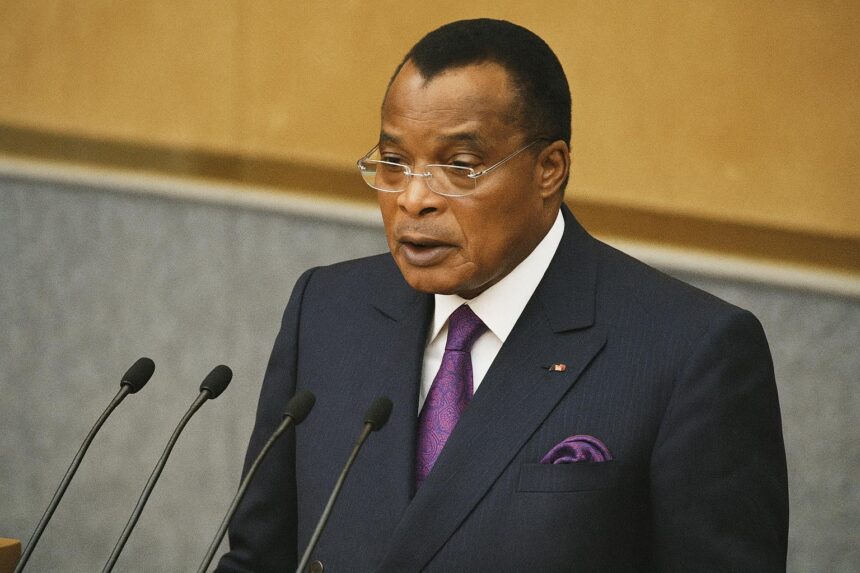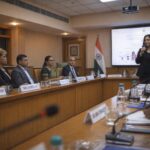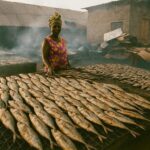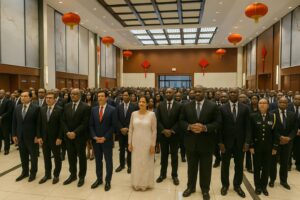A Brazzaville Fireside Summit
At dusk on 27 July 2025, a dozen senior Gabonese politicians slipped through the discreet gates of the presidential residence in Mpila. Denis Sassou-Nguesso, whose tenure has given him the aura of a regional elder, received them not in the formal marble halls of the Palais du Peuple but in a wood-panelled lounge more conducive to candour. The choice of venue, advisers say, was deliberate: a signal that the quarrel tearing apart the Parti Démocratique Gabonais (PDG) was a family matter before it was a public spectacle.
A Party in Search of Itself
Since the military takeover of August 2023 in Libreville, the PDG—founded by the late Omar Bongo and long steered by his son Ali—has drifted between nostalgia and uncertainty. The January 2025 congress that elevated former finance minister Blaise Louembé Kouya alongside secretary-general Angélique Ngoma was contested by stalwarts loyal to Ali Bongo, among them Ali Akbar Onanga Y’Obegue and Francis Nkea Ndzigue, who insist that only the ex-president, now recovering in London, may summon party organs (Africa Intelligence, 8 Feb 2025). That impasse has paralysed the movement at the very moment transitional authorities in Libreville are drafting a timeline for multi-party elections.
Family Ties as Diplomatic Assets
Sassou-Nguesso’s mediation is inseparable from kinship. His grandson and advisor Omar-Denis Junior Bongo—Ali Bongo’s own son—co-hosted the meeting, flanked by his brother Christian. Their presence lent generational legitimacy to the session and underscored how the Bongo lineage still commands deference across the Ogooué. According to a participant, Sassou-Nguesso opened the talks by recalling Omar Bongo’s role in securing the 1999 Libreville Accord that helped end Congo’s civil conflict, implying that Brazzaville now returned the favour.
Regional Calculus Beyond Libreville
Observers in Yaoundé and Luanda note that Congo-Brazzaville has long preferred political continuity on its western flank. A fragmented PDG could embolden fringe currents inside Gabon, complicating cross-border security cooperation on the Ogooué-Ivindo corridor where illicit timber and gold networks operate (RFI, 2 May 2025). By shepherding a compromise that maintains the PDG within the Bongo orbit, Sassou-Nguesso aims to keep dialogue channels with Gabon’s junta leader Brice Oligui Nguema open, while ensuring that any forthcoming civilian handover will involve actors amenable to Brazzaville’s strategic priorities.
Quiet Diplomacy and Its Limits
Participants emerged from Mpila with a draft memorandum establishing a joint steering committee charged with preparing an extraordinary party conference before December 2025. Both factions pledged to freeze public recriminations and to recognise interim decisions endorsed by the committee, which will be co-chaired by Ngoma and Onanga Y’Obegue. Though modest, the breakthrough was hailed by Libreville’s diplomatic corps as evidence of “Central African solutions to Central African problems” (Jeune Afrique, 29 July 2025).
Yet caution prevails. The Gabonese transition charter bars ex-presidents from running in the next election, and any perception that the PDG is merely a vehicle for Ali Bongo’s eventual return could stiffen military resistance. Moreover, younger activists within the party question hereditary politics, a sentiment galvanised by the coup’s promise of renewal. The coming months will test whether Sassou-Nguesso’s discreet brokerage can outlast entrenched ambitions.
For now, Brazzaville’s fireplace diplomacy has bought the PDG time—an intangible commodity in a region where political clocks often move faster than legal ones. By positioning himself as guarantor of intra-party cohesion rather than external arbiter, Denis Sassou-Nguesso has reinforced both familial bonds and Congo’s reputation for poised statecraft, all without compromising the sovereign prerogatives of its neighbour.




















